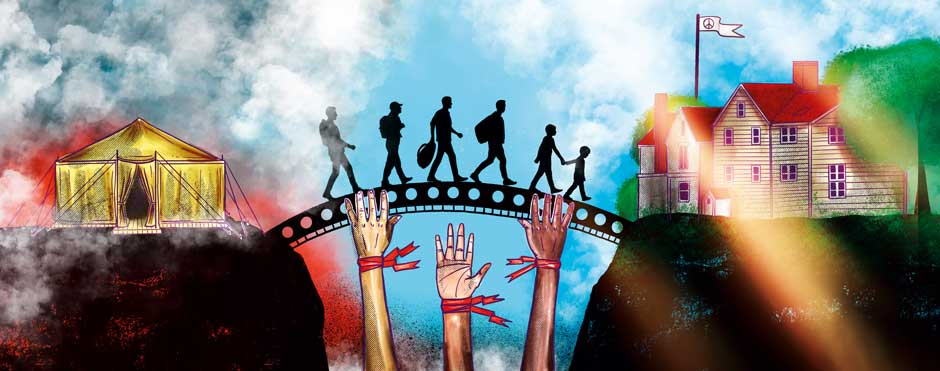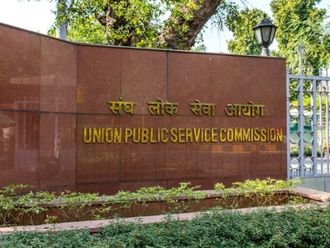For many years now, groups that work with refugees have fought to put an end to the refugee camp. It’s finally starting to happen.
Camps are a reasonable solution to temporary dislocation. But refugee crises can go on for decades. Millions of refugees have lived in their country of shelter for more than 30 years. Two-thirds of humanitarian assistance — intended for emergencies — is spent on crises that are more than eight years old.
Camps are stagnant places. Refugees have access to water and medical care and are fed and educated, but are largely idle. “You keep people for 20 years in camps — don’t expect the next generation to be problem-free,” said Xavier Devictor, who advises the World Bank on refugee issues. “Keeping people in those conditions is not a good idea.” It’s also hard to imagine a better breeding ground for terrorists.
“As long as the system is ‘we feed you,’ it’s always going to be too expensive for the international community to pay for,” Devictor said. It’s gotten more and more difficult for the United Nations High Commissioner for Refugees to raise that money; in many crises, the refugee agency can barely keep people from starving. It’s even harder now as nations turn against foreigners - even as the number of people fleeing war and violence has reached a record high.
At the end of last year, nearly 70 million people were either internally displaced in their own countries, or had crossed a border and become a refugee. That is the largest number of displaced in history — yes, more than at the end of the Second World War. The vast majority flee to neighbouring countries — which can be just as badly off.
Last year, the United States accepted about 30,000 refugees.
Uganda, which is a global model for how it treats refugees, has one-seventh of America’s population and a tiny fraction of the wealth. Yet, it took in 1,800 refugees per day between mid-2016 and mid-2017 from South Sudan alone. And that’s one of four neighbours whose people take refuge in Uganda.
Bangladesh, already the world’s most crowded major nation, has accepted more than a million Rohingya fleeing ethnic cleansing in Myanmar. “If we can feed 160 million people, then (feeding) another 500,000-700,000 ... We can do it. We can share our food,” Sheikh Hasina, Bangladesh’s Prime Minister, said last year.
Lebanon is host to approximately 1.5 million Syrian refugees, in addition to a half-million Palestinians, some of whom have been there for generations. One in three residents of Lebanon is a refugee.
The refugee burden falls heavily on a few, poor countries, some of them at risk of destabilisation, which can in turn produce more refugees. The rest of the world has been unwilling to share that burden.
But something happened that could lead to real change: Beginning in 2015, hundreds of thousands of Syrian refugees crossed the Mediterranean in small boats and life rafts into Europe. Suddenly, wealthy European countries got interested in fixing a broken system: Making it more financially viable, more dignified for refugees and more palatable for host governments and communities.
Sharing the responsibility
In September 2016, the United Nations General Assembly unanimously passed a resolution stating that all countries shared the responsibility of protecting refugees and supporting host countries. It also laid out a plan to move refugees out of camps into normal lives in their host nations. Donor countries agreed they would take more refugees and provide more long-term development aid to host countries: Schools, hospitals, roads and job-creation measures that can help both refugees and the communities they settle in. “It looked at refugee crises as development opportunities, rather than a humanitarian risk to be managed,” said Marcus Skinner, a policy adviser at the International Rescue Committee.
The UN General Assembly will vote on the specifics next month (whatever they come up with won’t be binding). The administration of United States President Donald Trump pulled out of the United Nations’ Global Compact on Migration, but so far it has not opposed the refugee agreement.
There’s a reason refugee camps exist: Host governments like them. Liberating refugees is a hard sell. In camps, refugees are the United Nations’ problem. Out of camps, refugees are the local governments’ problem. And they don’t want to do anything to make refugees comfortable or welcome.
Bangladesh’s emergency response for the Rohingya has been staggeringly generous. But “emergency” is the key word. The government has resisted granting Rohingya schooling, work permits or free movement. It is telling Rohingya, in effect, “Don’t get any ideas about sticking around.”
This attitude won’t deter the Rohingya from coming, and it won’t send them home more quickly. People flee across the closest border — often on foot — that allows them to keep their families alive. And they’ll stay until home becomes safe again. “It’s the simple practicality of finding the easiest way to refuge,” said Victor Odero, regional advocacy coordinator for East Africa and the Horn of Africa at the International Rescue Committee. “Any question of policies is a secondary matter.”
So far, efforts to integrate refugees have had mixed success. The first experiment was a deal for Jordan, which was hosting 650,000 Syrian refugees, virtually none of whom were allowed to work. Jordan agreed to give them work permits. In exchange, it got grants, loans and trade concessions normally available only to the poorest countries.
However, though the refugees have work permits, Jordan has put only a moderate number of them into jobs.
Any agreement should include the views of refugees from the start — the Jordan Compact failed to do this. Aid should be conditioned upon the right things. The deal should have measured refugee jobs, instead of work permits. Analysts also said the benefits should have been targeted more precisely, to reach the areas with most refugees.
To spread this kind of agreement to other nations, the World Bank established a $2 billion (Dh7.35 billion) fund in July 2017. The money is available to very poor countries that host many refugees, such as Uganda and Bangladesh. In return, they must take steps to integrate refugees into society. The money will come as grants and zero interest loans with a 10-year grace period. Middle-income countries like Lebanon and Colombia would also be eligible for loans at favourable rates under a different fund.
Over the last 50 years, only one developing country has granted refugees full rights. In Uganda, refugees can live normally. Instead of camps there are settlements, where refugees stay voluntarily because they get a plot of land. Refugees can work, live anywhere, send their children to school and use the local health services. The only thing they can’t do is become Ugandan citizens.
Given the global hostility to refugees, it is remarkable that Ugandans still approve of these policies. “There have been flashes of social tension or violence between refugees and their hosts, mostly because of a scarcity of resources,” Odero said. “But they have not become widespread or protracted.”
Serving a million more people
This is the model the United Nations wants the world to adopt. But it is imperilled even in Uganda — because it requires money that isn’t there.
The new residents are mainly staying near the South Sudan border in Uganda’s north — one of the least developed parts of the country. Hospitals, schools, wells and roads were crumbling or nonexistent before, and now they must serve a million more people.
Joel Boutroue, the head of the United Nations refugee agency in Uganda, said current humanitarian funding covered a quarter of what the crisis required. “At the moment, not even half of refugees go to primary school,” he said. “There are around 100 children per classroom.”
Refugees are going without food, medical care and water. The plots of land they get have grown smaller and smaller.
Uganda is doing everything right — except for a corruption scandal. It could really take advantage of the new plan to develop the refugee zone. That would not only help refugees, it would help their host communities. And it would alleviate growing opposition to rights for refugees. “The Ugandan government is under pressure from politicians who see the government giving favoured treatment to refugees,” Boutroue said. “If we want to change the perception of refugees from recipients of aid to economic assets, we have to showcase that refugees bring development.”
Humanitarian aid
The World Bank has so far approved two projects — one for water and sanitation and one for city services such as roads and trash collection. But they haven’t gotten started yet.
Devictor said that tackling long-term development issues was much slower than providing emergency aid. “The reality is that it will be confusing and confused for a little while,” he said. Water, for example, is trucked in to Uganda’s refugee settlements, as part of humanitarian aid. “That’s a huge cost,” he said. “But if we think this crisis is going to last for six more months, it makes sense. If it’s going to last longer, we should think about upgrading the water system.”
Most refugee crises are not surprises, Devictor said. “If you look at a map, you can predict five or six crises that are going to produce refugees over the next few years.” It’s often the same places, over and over. That means developmental help could come in advance, minimising the burden on the host. “Do we have to wait until people cross the border to realise we’re going to have an emergency?” he said.
Well, we might. If politicians won’t respond to a crisis, it’s hard to imagine them deciding to plan ahead to avert one. Political commitment, or lack of it, always rules. The world’s new approach to refugees was born out of Europe’s panic about the Syrians on their doorstep. But no European politician is panicking about South Sudanese or Rohingya refugees — or most crises. They’re too far away. The danger is that the new approach will fall victim to the same political neglect that has crippled the old one.
— New York Times News Service
Tina Rosenberg is a co-founder of the Solutions Journalism Network, which supports rigorous reporting about responses to social problems.









